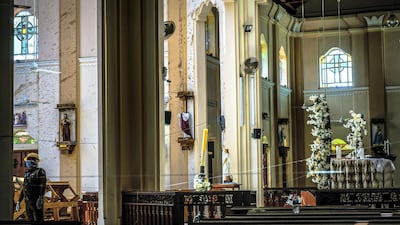ISIS claimed responsibility on Tuesday for the coordinated suicide attacks on Sri Lanka that killed 321 people earlier as mourners buried the dead across three cities.
The militant group issued its claim through its self-styled news agency, releasing a photo and video of eight attackers purportedly responsible for the wave of attacks on three Sri Lankan churches and three luxury hotels on Sunday. A fourth planned hotel attack failed.
ISIS has regularly claimed attacks in retrospect without evidence but it showed the men pledging allegiance to leader Abu Bakr Al Baghdadi with an ISIS flag in the background, potentially giving the claim more credence. Yet it only gave the noms de guerre of seven fighters allegedly involved.
ISIS has been trying to expand its reach across Asia since it began to lose vast tracts of territory in Iraq and Syria. The continent is home the world’s largest populations of Muslims, in Indonesia, India and Pakistan.
The Sri Lankan government has blamed a small extremist group known as National Tawheed Jamaat for the attack. Security experts believe this group was at least inspired by ISIS, if not directly connected to the group.
Sri Lankan officials said the attacks were carried out in retaliation for the attacks on two mosques in Christchurch, New Zealand, last month that killed 50 people. The New Zealand government said it had no intelligence linking the two assaults.
The attack is among the deadliest ever claimed by ISIS and one of the biggest terrorist attacks worldwide since the 9/11 terror attacks in 2001. British and American security services have now joined the Sri Lankan investigation into the attack.
Sri Lankan President Maithripala Sirisena said the country had intelligence that “international terror groups” were assisting Sri Lankan militants.
He said he will replace the heads of the country’s defence forces by Wednesday. The government received a warning from a foreign intelligence agency two weeks before the attacks but failed to act upon it, leading to widespread domestic criticism. Both Mr Sirisena and his political rival Prime Minister Ranil Wickremesinghe say they did not see the warning.
"I will completely restructure the police and security forces in the coming weeks. I expect to change the heads of defence establishments within next 24 hours," Mr Sirisena said a televised address to the nation.
"The security officials who got the intelligence report from a foreign nation did not share it with me. Appropriate actions would have been taken. I have decided to take stern action against these officials."
Sri Lankan premier Mr Wickremesinghe warned at a press conference that there are more explosives and militants at large.
ISIS maintains a global network of supporters despite the fall of its pseudo-state in Syria last month. It has claimed responsibility for attacks carried out in the Philippines and the Democratic Republic of Congo this year.
A national day of mourning was in place across Sri Lanka on Tuesday to commemorate the 321 victims of the attacks on hotels and churches in this city, Colombo and Batticaloa. The United Nations children's agency said on Tuesday that at least 45 children were killed in the attacks.
Houses and streets around Negombo were adorned with white flags to commemorate the dead on Tuesday.
Police issued a directive on Tuesday that anyone parking a car and leaving it unattended must place a note with their phone number on the windscreen. Postal officials said they would not accept pre-wrapped parcels for mailing.
Funerals in the city were being staggered three or four at a time, unannounced to the public for security reasons, according to Cardinal Malcolm Ranjith, the archbishop of Colombo.

